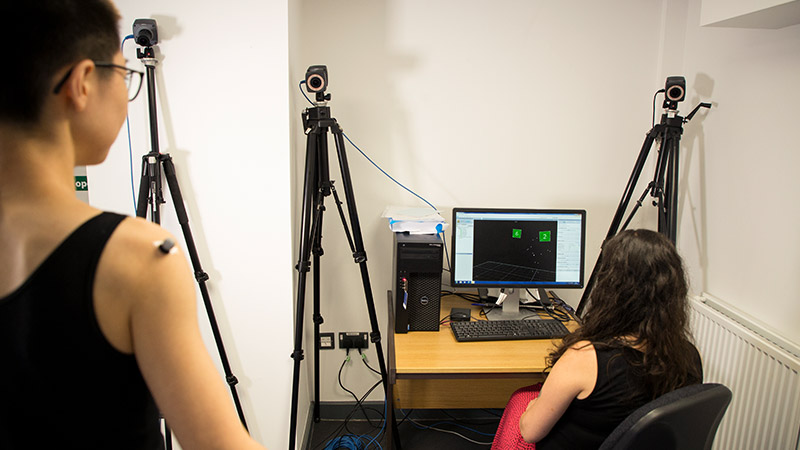Psychology
MSc or PGDip or PGCert
Join our MSc Psychology Conversion Course Open Evening at our Headington Campus
UCAS code: P045760
Start dates: September 2026
Full time: MSc: 12 months; for PGDip/PGCert: please contact us
Part time: MSc: 24 months; for PGDip/PGCert, please contact us
Location: Headington
School(s): School of Social Sciences, School of Psychology, Social Work and Public Health
Overview
What makes us who we are? How do children learn? And how can we support people with mental health issues? Explore these topics and more on a course that sets you up for a career as a professional psychologist.
If you have little prior knowledge of psychology, our MSc Psychology is the ideal conversion course. You’ll study alongside people looking to make a career change, those interested in the psychology of their industry and psychology students looking for an accredited degree by the British Psychological Society (BPS).
You’ll study core content set by the BPS and put your knowledge into practice in a piece of hands-on, independent research. You’ll learn more about your career possibilities and have opportunities to develop your experiences and skills (e.g. supporting staff working in active research). All on-site learning takes place across 1 or 2 fixed days per week depending on full or part-time studies.
Completing our BPS accredited MSc establishes the Graduate Basis for Chartered Membership of the BPS giving you a strong foundation and gives you access for your next steps.

Why Oxford Brookes University?
-
Teaching and facilities
Learn from active researchers in purpose-built facilities, including the Baby Lab. You’ll have opportunities to get hands-on experience during the course.
-
Affordability
We understand the cost of living is a factor so we made competitive pricing a priority.
-
Employability
Enhance your CV with graduate membership of the British Psychological Society and practical experience.
-
Location and facilities
We are close to transport links and lie within an hour’s drive of many major cities across the southern counties and midlands.
-
Fixed teaching timetable
Balance work and family commitments with a fixed timetable of on-site teaching 2 days per week (Wednesday and Friday) as a full-time student or 1 day if you study part-time (Friday in year 1, Wednesday in year 2).
-
Accreditation(s)
Students can qualify for Graduate Basis for Chartered Membership (GBC) with the British Psychological Society (BPS) if they follow the approved program of study
Course details
Study modules
On-site teaching is two days per week for full-time students or one day for part-time students. Please be aware you'll require additional time for (e.g. for independent study, reading, working on your assessments etc). You'll need to balance this with your other time commitments.
The time you devote to your studies may vary over the teaching period (e.g. more time when assessments are due) and may vary from student to student - some students may devote more time than others. As a general guide it is helpful to think of the total time you devote to your studies (i.e. in class and independent work) as being Monday to Friday (for full-time students; and half that period for part-time students). This will help you plan how the time you spend on your studies can be scheduled around any other time commitments that you may have.
The modules listed below are for the master's award. For the PGDip and PGCert awards your module choices may be different. Please contact us for more details.
Please note: As our courses are reviewed regularly as part of our quality assurance framework, the modules you can choose from may vary from those shown here. The structure of the course may also mean some modules are not available to you.
Research
95% of our research is of internationally recognised standard (Research Excellence Framework 2014). Our research has led to improved practice guidelines in both health and education, the development of valuable assessment tools and the adoption of new policies and practices. We develop knowledge and understanding that informs policy and improves people’s lives.
We continue to attract significant funding awards from bodies including:
- ESRC
- MRC
- UKRI
- Cancer Research
- Technology Strategy Board
- Ministry of Defence
- National Institute for Health Research
- Leverhulme Trust.
Working within the Centre for Psychological Research, Oxford Brookes Psychology staff are actively involved in their own research programmes, as members of our four key research groups: Developmental Psychology; Applied Social and Health Psychology; Cognition and Cognitive Neuroscience; and Prevention Science. Research interests are woven into teaching across all the MSc modules, integrating theoretical content and applied research methods.

Careers
Graduate from MSc Psychology with a recognised qualification in psychology and open doors to:
- Professional training including educational, psychological or clinical psychology.
- Higher academic study with a research PhD or specialised master’s.
- Broad workplace opportunities, with alumni using their MSc Psychology skills in hospitality, the charitable sector and the publishing industries.
Your career is important to us, so we offer volunteer opportunities with charities and organisations. You can also attend career talks, an alumni conference and lively research seminars.
One of our strengths at Oxford Brookes is our in-house research which offers hands-on experience for your CV.
Our teaching staff includes many active researchers who need research assistants on a diverse range of projects where you can also learn about the equipment in our labs.
Your academic adviser will meet with you regularly to talk about ways to progress and offer practical help with applications for future training and employment.
Student profiles
Our Staff
Professor Luci Wiggs
Luci teaches on a range of undergraduate and postgraduate modules and is module leader for Psychology of Mental Health Conditions, Psychological Health and Disorders and the Dissertation module. Luci is also the Subject Coordinator for the MSc Psychology degree course.
Read more about LuciEntry requirements
Specific entry requirements
You should normally hold a minimum of a second class honours degree (2:2), or equivalent.
Please also see the University's general entry requirements.
English language requirements
For applicants whose first language is not English, an Academic IELTS score of 6.0 (with 5.5 in Reading and Writing, and 5.5 in Listening and Speaking) is required.
Please also see the University's standard English language requirements.
Pathways courses for international and EU students
We offer a range of courses to help you meet the entry requirements for your postgraduate course and also familiarise you with university life in the UK.
Take a Pre-Master's course to develop your subject knowledge, study skills and academic language level in preparation for your master's course.
If you need to improve your English language, we offer pre-sessional English language courses to help you meet the English language requirements of your chosen master’s course.
English requirements for visas
If you need a student visa to enter the UK you will need to meet the UK Visas and Immigration minimum language requirements as well as the University's requirements. Find out more about English language requirements.
Terms and conditions of enrolment
When you accept our offer, you agree to the Terms and Conditions of Enrolment. You should therefore read those conditions before accepting the offer.
International qualifications and equivalences
How to apply
Application process
Tuition fees
Questions about fees?
Contact Student Finance on:
Tuition fees
The following factors will be taken into account by the University when it is setting the annual fees: inflationary measures such as the retail price indices, projected increases in University costs, changes in the level of funding received from Government sources, admissions statistics and access considerations including the availability of student support.
How and when to pay
Tuition fee instalments for the semester are due by the Monday of week 1 of each semester. Students are not liable for full fees for that semester if they leave before week 4. If the leaving date is after week 4, full fees for the semester are payable.
- For information on payment methods please see our Make a Payment page.
- For information about refunds please visit our Refund policy page
Financial support and scholarships
Additional costs
Please be aware that some courses will involve some additional costs that are not covered by your fees. Specific additional costs for this course are detailed below.
You will need to print a poster of your research plans so that you can present this at a mini-conference (about £10). Most recommended reading material takes the form of papers available from the library; however, you should expect to incur additional costs if printing materials or purchasing optional textbooks (likely to be about £40 per book). Whilst much equipment is available from the department at no charge, you are responsible for any other costs associated with the research dissertation (e.g. printing questionnaires or materials for participants, your travel costs etc). The extent of these costs will vary depending on the nature of the research project.
Programme changes:
On rare occasions we may need to make changes to our course programmes after they have been
published on the website. For more information, please visit our
changes to programmes page.


